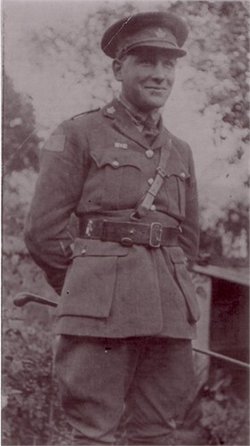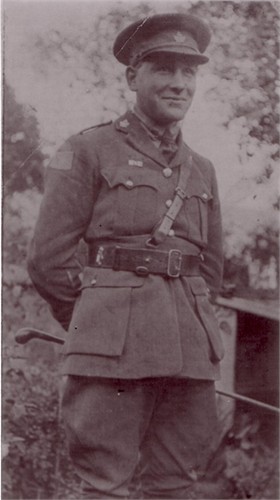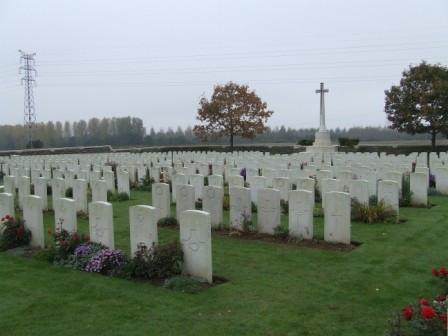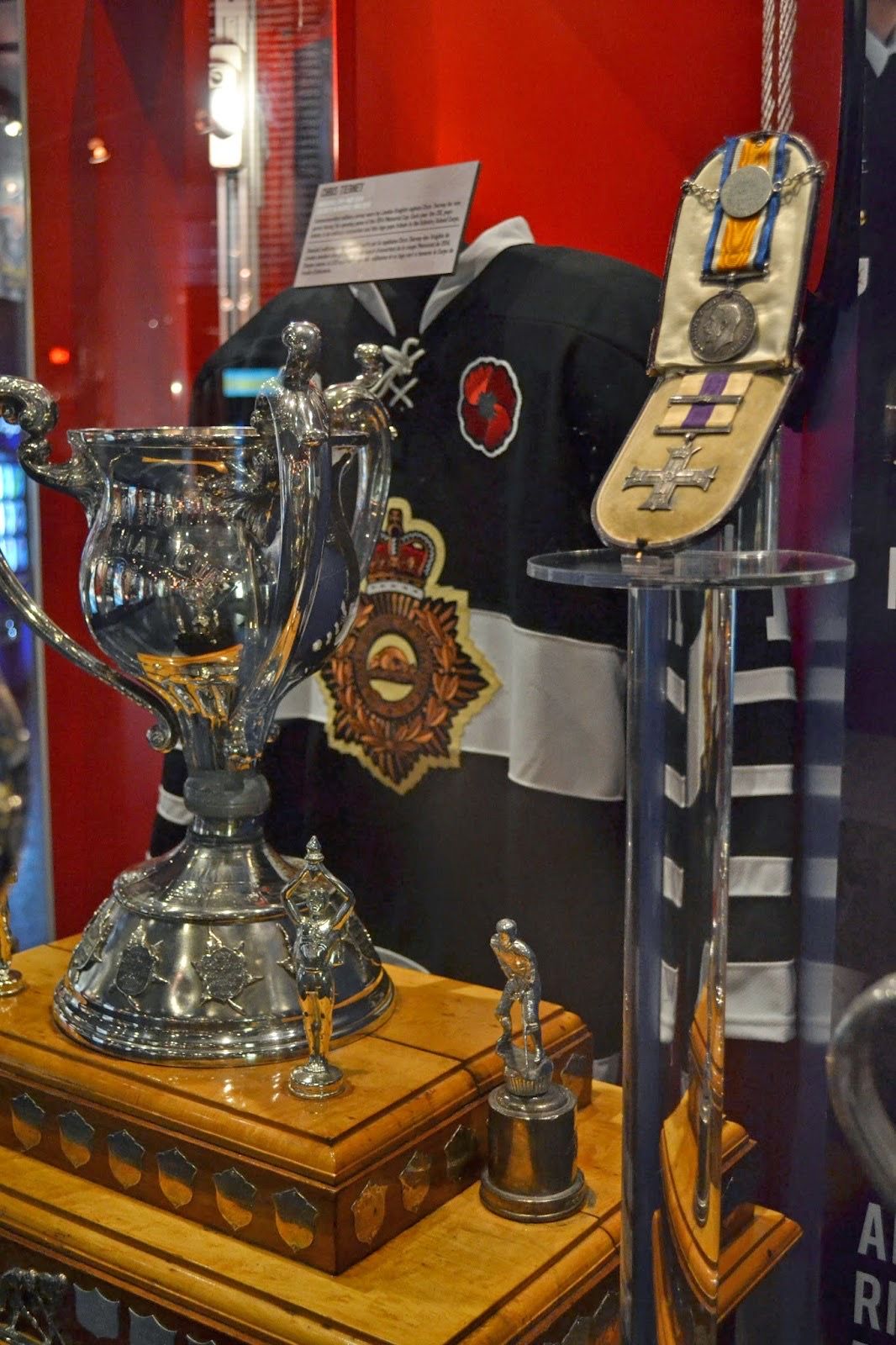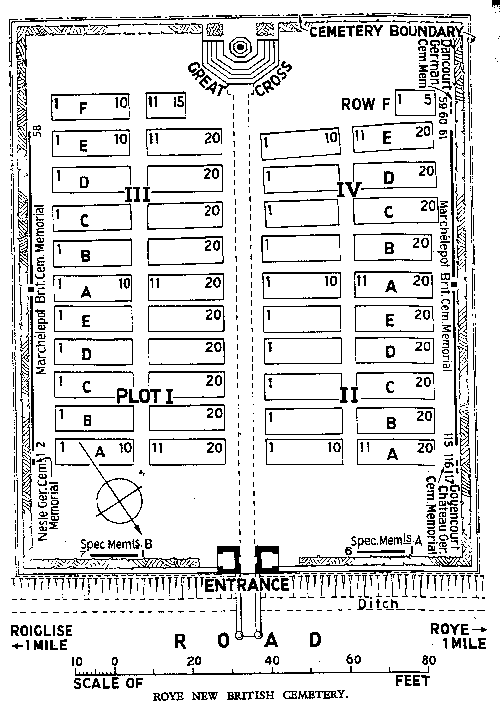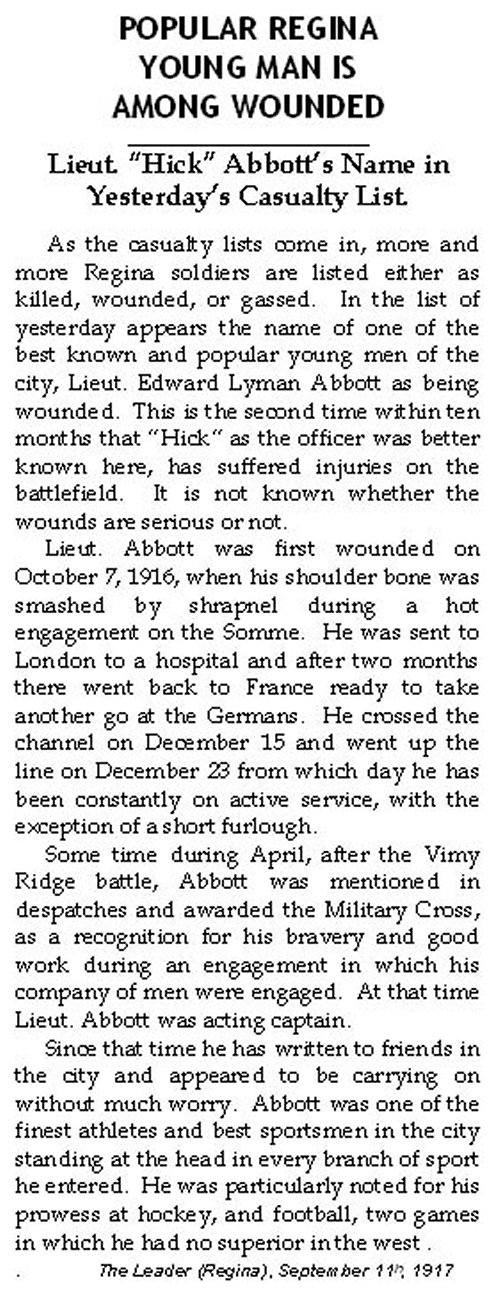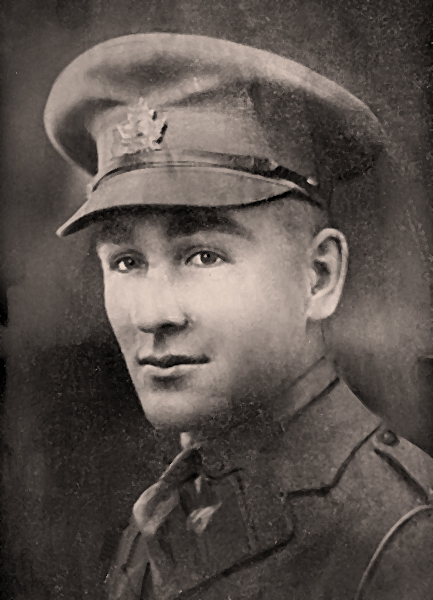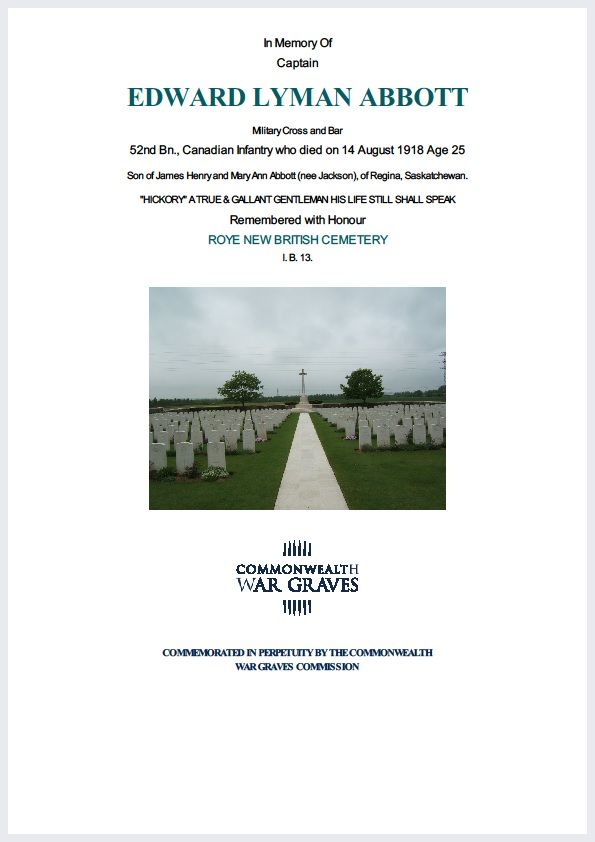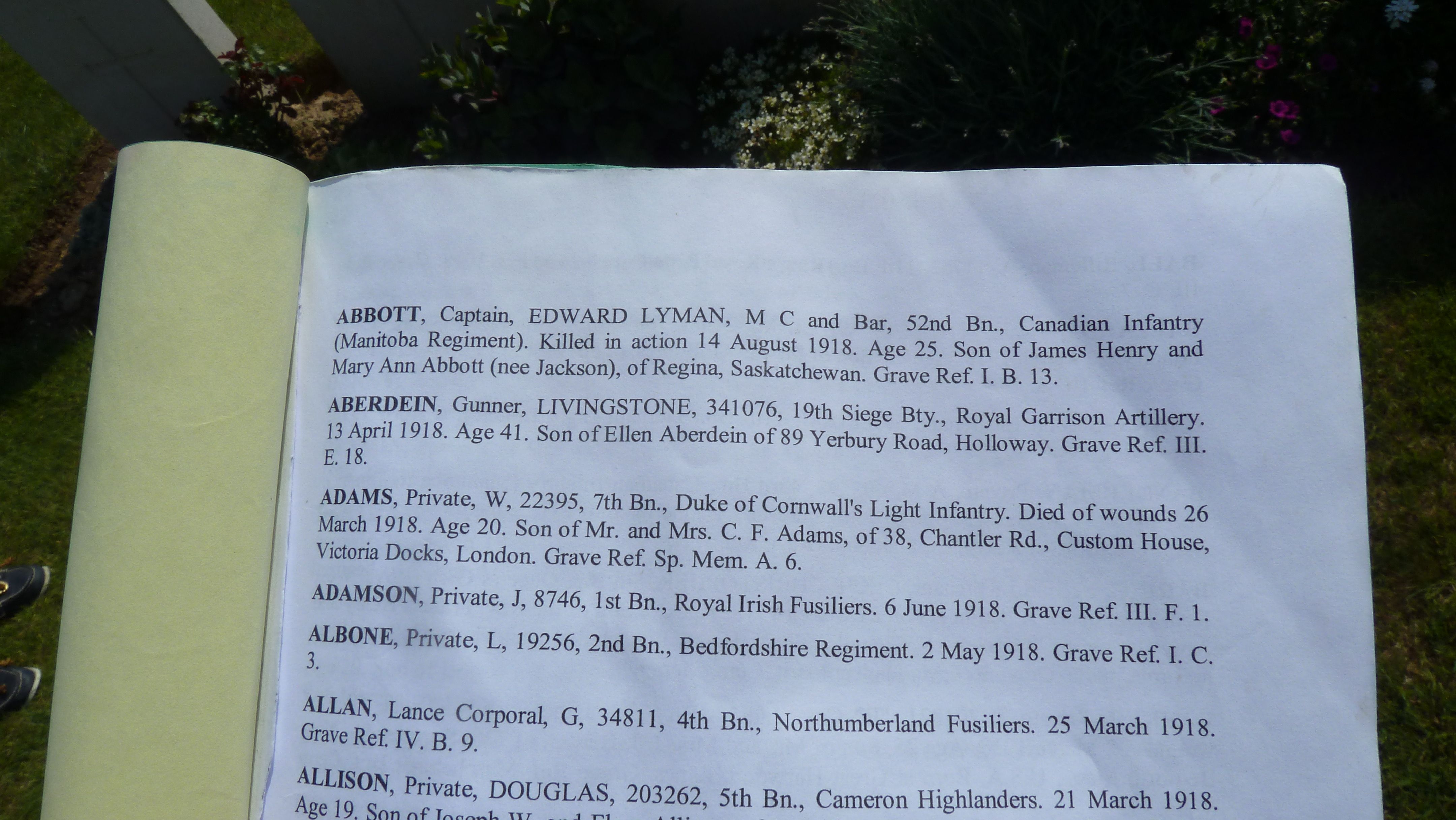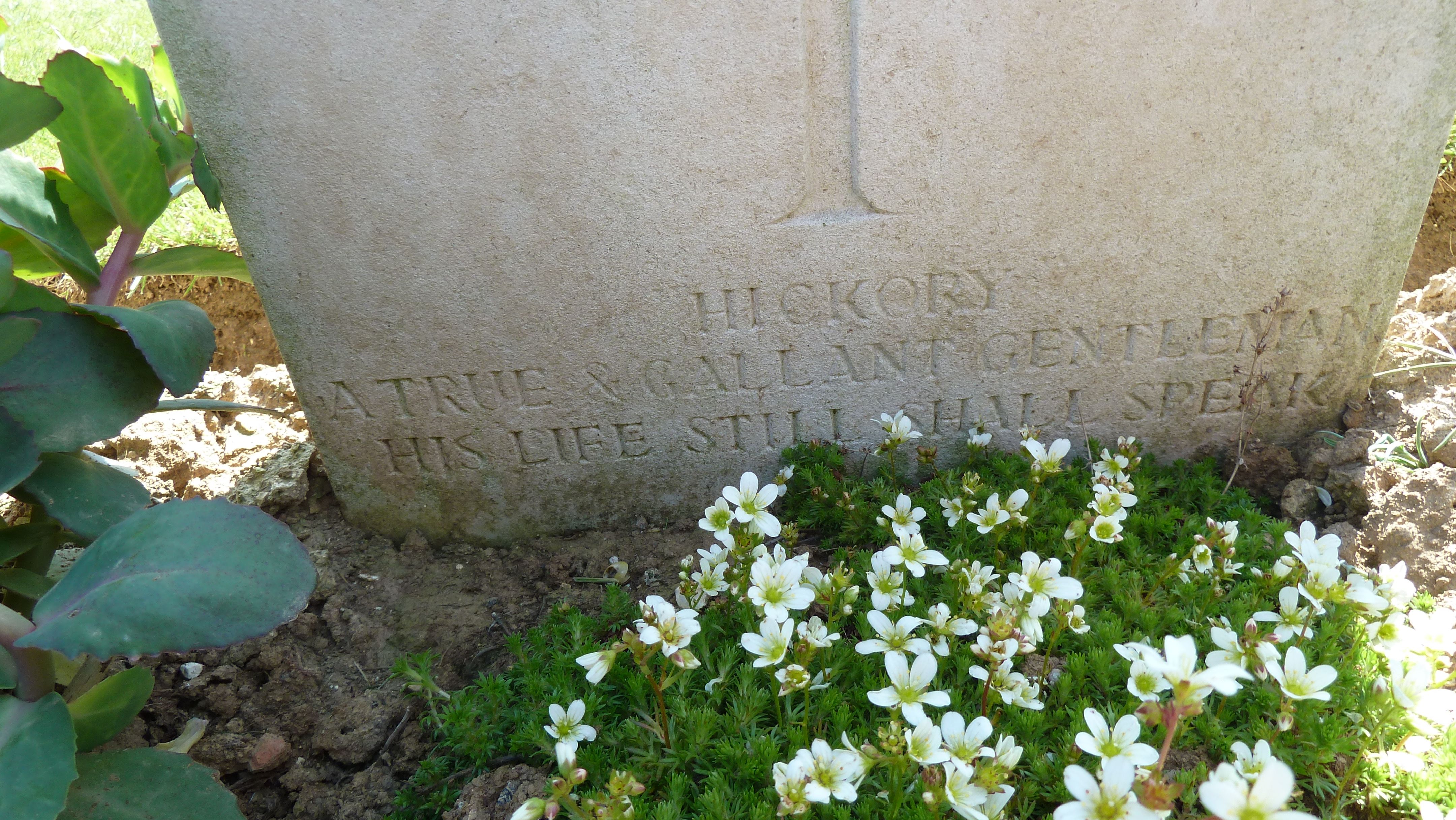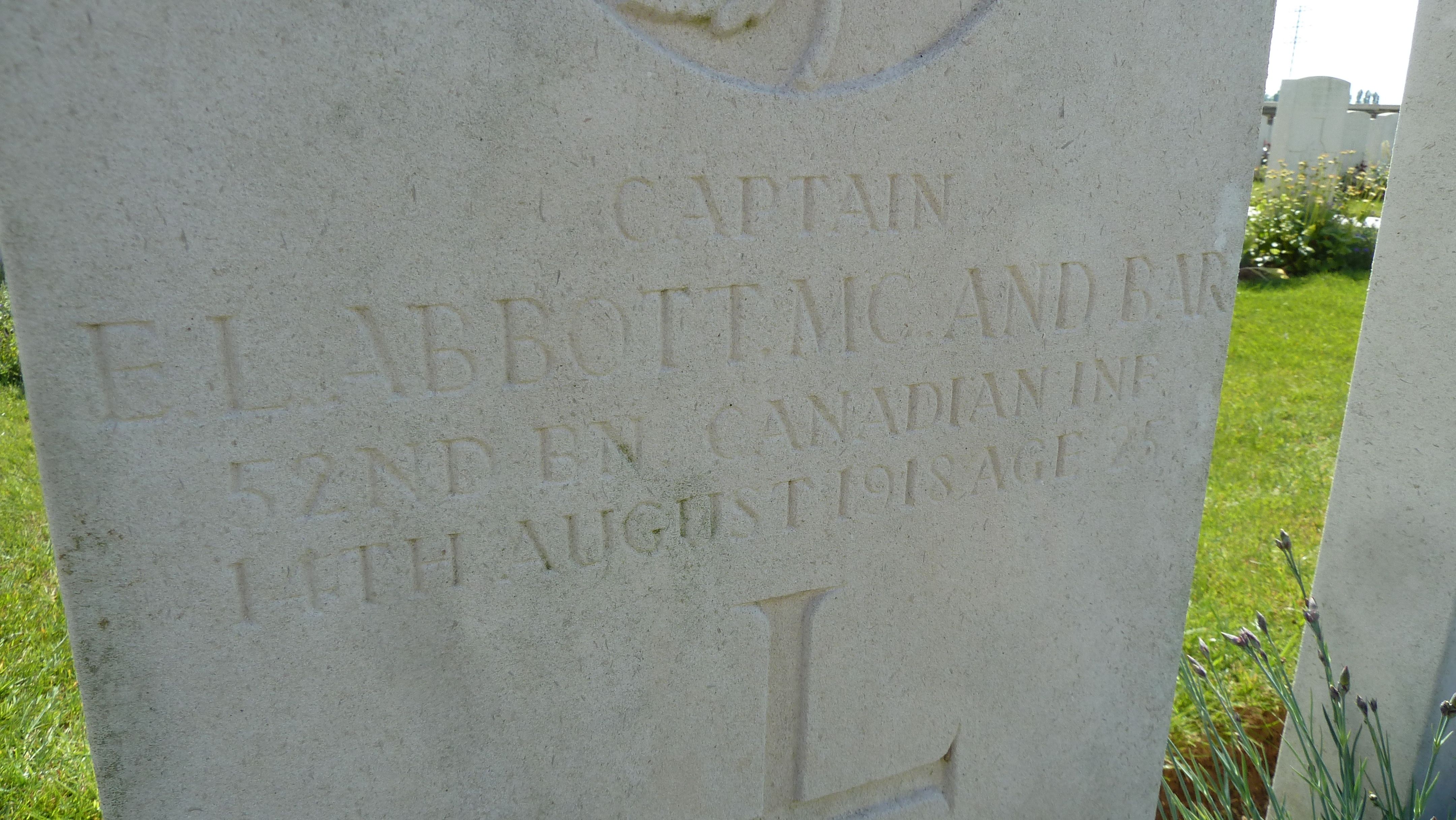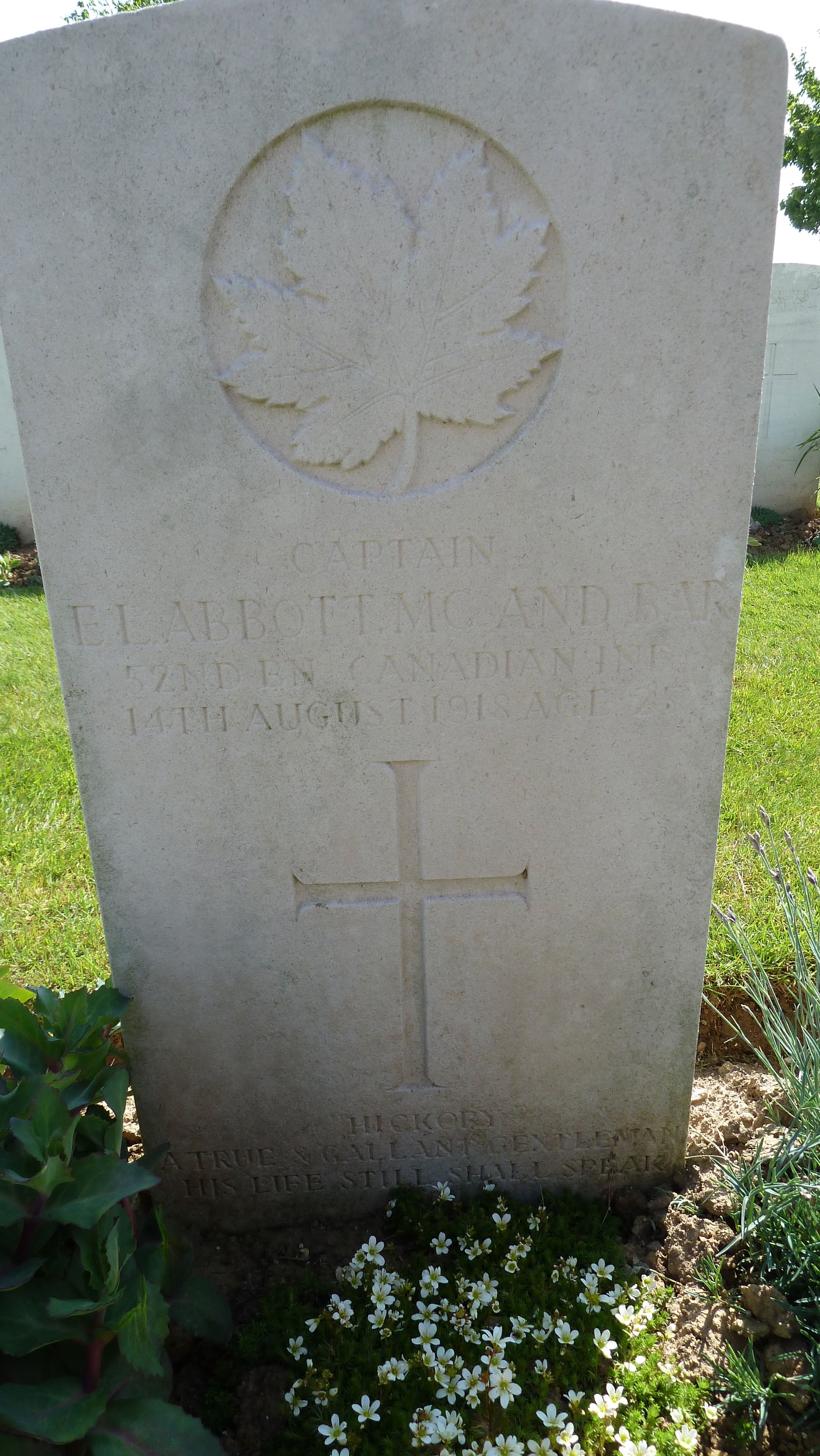Death: By a Sniper's bullet to the head,while in action south-east of Amiens - World War I, Battle of Amiens.
Military Service: Force: 25, Unit: Canadian Infantry (Manitoba Regiment),
Division: 52nd BN, Honours and Awards: Military Cross
Photo of Abbott: To the right - Abbott's file
Photo of New British Cemetery - Roye New British Cemetery is located on the south-eastern outskirts of Roye, on the D934 Roye to Noyon road. Roye is located 100km north of Paris on the A1 Paris-Lille Highway (Autoroute du Nord), in the County of the Somme, France.- Captain Edward Abbott - (Plot 1, Row B, Grave 13)
In 1918, the Saskatchewan Amateur Hockey Association (SAHA) offered the Abbott Memorial Cup to the Canadian Amateur Hockey Association (CAHA) in memory of Captain Edward Lyman "Hick" Abbott who died in active service in World War 1. The Regina Patricia were the first to win the Cup in the 1918-1919 season.
He was a superb athlete and, just as important, he was a true sportsman. Everyone in southern Saskatchewan knew Abbott as Hick, which was shortened from Hickory, and he was loved by young and old alike.
"Hick," was Captain of the Regina Victoria's Hockey Team when they won the (Allan Cup) Senior Championship of Canada in 1914. Here is how they won it:
The defending 1913 Allan Cup champions, Winnipeg Hockey Club champions, failed to win the Winnipeg Hockey League. With a 6-2-0 record; the Winnipeg Monarchs were given the right to carry the Allan Cup. They received a challenge from the Kenora Thistles, Manitoba Hockey League champions, and played in Winnipeg; the Monarchs won 6-2. Winnipeg Monarchs carried the Allan Cup.
There was a second challenge: They received a challenge from the Regina Victorias, Saskatchewan champions, and played in Winnipeg; The Regina Victorias won 5-4. Now Regina Victorias captured the Allan Cup. But we are not finished, there is a third challenge: The Regina Victoria received a challenge from Grande-Mere, Quebec champions, and they played in Regina. It was a two game total goal series. Regina won 6-4 and 4-1 winning the series 10-goals-to-5. With no more challengers accepted in time to play, the Victorias won the 1914 Allan Cup.
The winner of the Abbott Cup was to represent Western Canada as a challenger for the Canadian Championship Memorial Cup. The franchise to win the most Abbott Cups was the Regina Patricias (Pats) with 11.
The following appeared in the Regina Daily Star on November 11, 1927, "The only living memorial of Captain Edward Lyman Abbott has been found on the walls of the old Grange Tunnel on Vimy Ridge dated May 10, 1917, where many names of Officers of the 52nd Battalion were inscribed.". This Tunnel is to be kept intact. Had Lyman lived until the next day, he would have been on his way overseas, to England, to train to become a Major.
Captain Abbott had completed his studies to enter a law firm before he went overseas. He was the Chief Clerk in the Attorney General's Branch of the Provincial Government when he was granted a commission in the Regiment on July 8, 1915. A town in Saskatchewan is named "Abbott" after him.
***************
Mary Sawyer, a relative of Abbott living in Florida, U.S.A., came across my Family Tree in Ancestry.com, and informed me (Ron "Scoreboard" Johnston) that Lyman was born May 1, 1891, in Lovering, Matchadash Township, Simcoe County, Ontario, to James Henry and Mary Ann Jackson. She also advised that the family moved to Saskatchewan in 1897 and settled in Balgonie after his mother's death.
Taken from my (Ron "Scoreboard" Johnston) family tree: By the time of Abbott's death on August 14, 1918, (died in France, Battle of Ameins in action - just east of Amiens) his father was already dead. Hick's medals went to his sister Robena, who was living in Regina, Saskatchewan, at 2072 Angus Street. (which was only a block north of where my wife (Marlene) lived). A plaque and scroll went to his brother, Samuel, at White Bear Indian Reserve, Saskatchewan.
Abbott's Will: Dated, July 1, 1916, indicated there may have been another woman - besides his sister - In his life. His will appointed his sister and R.D. MacMurchy, a Regina Barrister, as executors. It Read in part: " I give and bequeath unto my sister, Robena Myrtle Abbott, all property, real and personal in my possession or due me at time of my decease and in the advent of her prior decease all said property, real and personal to Miss Edith May Ongworthy, 2035 Hamilton St., Regina.
***************
Taken from the Regina Leader, 2008 - by Greg Drennin: Note, some parts from the article I have changed, with Greg's permission.
"Previous to going to the war, Abbott was one of the greatest hockey players that this Dominion every saw. He also was a stellar lacrosse, rugby, and soccer player. He piloted Regina to a western championship in rugby in 1915 and what he did to bring the Allan Cup to Regina any of the old-time fans know."
As we pause at the 11th hour of the 11th day of the 11th month, his story is but one of many worth remembering. This, then, is that story. Or at least part of it:
The gentlemen of Regina's sporting scene would gather at Joe Potts' Rose Athletic Parlours - on the east side of the 1700 block Rose Street. They would go there for a shave, maybe a trim and, most definitely, to talk about how their sporting world turned out.
The Rose Athletic Parlours was a seven-chair operation, with each barber having his own wash basin and mirror. There were two other huge, floor to ceiling, mirrors and a circular leather seat that surrounded a pole covered with beautiful leather backing. A long glass counter was home to a gold-coloured cash register and boxes of chocolate bars. Mahogany-veneered cabinets behind the counter were full of tobacco products.
There were photographs everywhere. (They didn't call them pictures back then.) Photographs of prominent athletes. Many of them autographed.
The billiard room was separate and featured Boston tables, although there was only one billiard table. Each table had its own free-standing mahogany cabinet in which players hung their hats and coats. This is where doctors, dentists, lawyers, and businessmen came to talk about the exploits of their favorite son.
Hick Abbott was of fair complexion. He had gray eyes that, in a blink, would steal a young girl's heart. And that hair, oh that light brown hair, that always had that naturally tousled look.
*****************
It shows in the 1901 Canadian Census that the whole family (five children) had moved west to Balgonie (northeast) of Regina. His father, James Henry, was a farmer in that area. His mother, Mary Ann Jackson, died April 1, 1907. His father then moved back east and married Janet Margaret Maria at Toronto in 1912. In this marriage he had two more children and died March 20, 1916. Edward may have moved to Regina where his sister, Robena Myrtle, had married a Frederick Smith. He lived with them after the passing of his mother. A brother, Samuel Percival Abbott, lived near White Bear, Sask. Edward had one other sister, Rose Gale, who married Henry Millidge. They were living at Kindersley.
Hick Abbott played football (rugby football, it was frequently called back then), hockey, baseball, lacrosse, soccer, and basketball. He excelled at them all. He played in high school and for club teams, on playgrounds or in a gymnasium.
But hockey was his game. He was a right winger who played for as many teams as he could. He played for the Regina Bees Capital Hockey Club, which won the Valkenburg Cup as the province's 1911-12 Amateur Champions.
But how was he to know that the highlight of his athletic career would come in the spring of 1914 when he helped the Regina Victorias to the 1914 Allan Cup title? The team photo refers to the Vics as World's Amateur Champions 1914. The newspaper refers to Abbott as "the speedy and consistent right wing who is the sharpshooter of the team."
But there was trouble in Europe where, before long, the First World War would be raging. Soon newspapers were full of casualty reports. Regina's sons were dying over there.
Naturally, Abbott heard the call, as did many of his teammates from that 1913-14 team, including goaltender Fred McCulloch, defencemen Charlie Otton and Austin Creswell, who was the team captain, and Freddy Wilson, the team rover.
Abbott took officer training in Winnipeg, qualifying for the rank of Lieutenant. He returned to Regina and enlisted with the 68th Battalion.
On the day Abbott enlisted – Sept. 23, 1915 – he was a 24 year old student at law living in Regina at 2254 Rose Street. Seven months later, on April 28, he was on the S.S. Olympic as it sailed from Halifax. Abbott headed overseas as a platoon commander and officer in charge of records.
Abbott was a true warrior. Whether it was on the field of play or on the field of war, there wasn't any "quit" in this man.
Upon his arrival in England, he quickly transferred to the 52nd Canadian Infantry Battalion, a trench unit. In the ensuing 26 months, shrapnel was the only thing that kept him from the front.
He was first injured on Oct. 7, 1916, while in action near Courcelette, about 30 miles northeast of Amiens, in what came to be known as the Battle of the Somme. Four days later, Abbott was admitted to No. 14 General Hospital at Boulogne with a wound to his left shoulder. Two days later, he was in England, safely ensconced in a war hospital in Reading, a few miles west of London. A doctor noted a "shrapnel bullet localized near wound." That shrapnel was removed on Oct. 24; he was discharged from hospital on Nov. 13, 1916.
On July 26, 1917, following the Battle of Vimy Ridge, Abbott was awarded the Military Cross "For conspicuous gallantry and devotion to duty. He handled his men in the most able manner, and successfully led them through an intense hostile barrage. He set a fine example of courage and initiative.".
Three months later, on Oct. 27, 1917, he was awarded a Bar to his Military Cross. The Bar, according to a letter Potts received from Abbott in early November, was "just for a little trench raiding affair.". On Aug. 14, with the battle almost won, Abbott – always the leader – was first out of a trench as he led a charge towards the enemy.
Abbott also mentioned that he now was wearing "... a pair of plate glass spectacles on account of recent injuries to my eyes." The glasses were the result of his being wounded for a second time. He took a bullet – or a piece of shrapnel – in the right temple on Sept. 4, 1917, while raiding enemy trenches near Leuze, just over the border from France in the southwest part of Belgium.
A medical report indicates this was a "Severe G.S.W. (gunshot wound) near right eye.". Before he reached the hospital in Boulogne, the shrapnel//bullet was "removed with giant and small magnet.".
The Sept. 11 edition of The Leader reported under the headline "Popular Regina Young Man Is Among Wounded": "As the casualty lists come in, more and more Regina soldiers are listed either as killed, wounded or gassed. In the list of yesterday appears the name of one of the best known and popular young men of the city, Lieut. Edward Lyman Abbott, as being wounded. This is the second time within 10 months that 'Hick' . . . has suffered injuries on the battlefield."
The story continued:
". . . he has written to friends in the city and appeared to be carrying on without much worry. Abbott was one of the finest athletes and best sportsmen in the city, standing at the head in every branch of sport he entered. He was particularly noted for his prowess at hockey and football, two games in which he had no superior in the west."
By Sept. 15, 1917, he had been "invalided, wounded and detached" to the Manitoba Regimental Depot and was being cared for in the 3rd London General Hospital in Wandsworth. A doctor's report noted: "Recommended for convalesence . . . to report back in three weeks." Abbott was discharged on Sept. 24, 1917, and spent the next month at St. Mark's College, leaving there on Oct. 25, 1917. The next entry in his medical record is dated Sept. 14, 1918. It is short and to the point: K. in A. (Killed in Action).
After recovering from his head wound, Abbott returned to France on Dec. 24, 1917. A week later, he was back with his unit.
With Capt. G.M. Thomson heading for England, application was made for Abbott to be an acting captain with the 52nd Battalion. That was approved on March 16, 1918, and Abbott was then a captain when the Battle of Amiens began (one of the war's most decisive battles).
The German's spring offensive had been stopped only eight miles from Amiens. Now it was time to push them back. Later, after the Armistice had been signed on Nov. 11, 1918, it was generally acknowledged that this was where the tide had turned. In two weeks, 46 German divisions were defeated – 34,250 prisoners taken and 270 heavy guns were captured. "It was," said Ludenhoff, "the black day of the German army in the war . . . To continue would be a gamble. The war would have to be ended.". It was the day on which the Battle of Amiens began, the battle in which Hick Abbott died.
According to Earl Longworthy, an acquaintance of Abbott's, he was killed by a sniper's bullet to the head. Longworthy was with Abbott's battalion the day after his death and reported the platoon "...worshiped the ground Abbott walked on and were in sorrowful spirits because of his death."
A testimonial (author unknown) reads in part:
"Abbott was the type of Canadian, and the type of Britisher, that the Germans cannot understand; the type that fights with a silent fury and yet that does not hate. Too much of a sportsman to fight unfairly, but more dangerous in attack than their finest products of hate-inspiration because of utter recklessness combined with a deadly skill and total inability to recognize defeat."
By the time of Abbott's death on Aug. 14, 1918, his father was dead also. Hick's medals went to his sister, Robena, who was living in Regina at 2072 Angus St. A plaque and scroll went to his brother, Samuel, at White Bear.
Abbott's Will, dated July 1, 1916, indicated there may have been another woman – besides his sister – in his life. His Will appointed his sister and R.D. MacMurchy, a Regina barrister, as executors.
It read in part:
"I give and bequeath unto my sister, Robena Myrtle Abbott, all property, real and personal in my possession or due me at the time of my decease and in the advent of her prior decease all said property, real and personal to Miss Edith May Longworthy, 2035 Hamilton St., Regina, Canada.".
Word of Abbott's death was reported in The Leader on Aug. 22, 1918:
"The death of the popular young Regina officer came as a great shock to his many friends in the city and to the hundreds who knew him throughout the province, particularly as one of the finest athletes who ever appeared before the public in the province.".
Joe Potts was devastated by the news and wrote an appreciation that appeared in The Leader: "The world of sport of Regina, and for that matter the entire province of Saskatchewan, is the poorer today by the loss of Hick Abbott. As long as Regina is, the name of Abbott will live. To the present generation, his name stands supreme as a monument to the best that was in sports. To the future generation, he has left an ideal for them to attain.
The citizens of Saskatchewan have lost one of nature's gentlemen, one who held dear the traditions of his land and one who ever had at heart one thing – the interest of his fellows. A hero among his fellows, he was equally loved by the boys. No business was ever too pressing to prevent him claiming their comradeship. To the younger lads of Regina his life and glorious death will be an inspiration.
In expressing these thoughts I am but giving voice to those of everyone in the city who knew him. As one who knew him intimately from the time he grew out of boyhood, the loss is personally great."
Potts made certain that Hick wouldn't be forgotten. He named his first-born son after Abbott – J. Lyman Potts, born on Nov. 11, 1916. This gentleman is now retired and living in Burlington, Ont.
Late in 1918, Joe Potts started a fund-raising drive, the result of which would be the Abbott Memorial Cup which, for years, would go annually to the champion of Western Canadian Junior Hockey. When the subscription drive started, the first name on the list was Lyman Potts ($10). The second name was that of Lieut. Austin Creswell, the captain of the 1914 Victorias. E.A. Jolly, a prominent Regina druggist, sent in $5 along with a note:
"Captain Abbott was one of the highest types of Canadian citizens and his record on the ice and subsequently on the battlefield proved him a man of whom all of us should be proud. I remember the great games with Melville when Abbott worked so valiantly and well for victory, and I also remember what a great power Abbott was to the Victoria team when they won the Allan Cup on that great night in Winnipeg nearly five years ago."
Dick Irvin was a 21-year-old centre on the Winnipeg Monarchs team that lost the 1914 Allan Cup final to the Vics. He would later prove to be one of the NHL's great coaches. He wrote from Belgium where he was a private "I am interested in what you say about the proposed Abbott Cup and you can put (me) down for a five spot. I think the idea splendid for junior hockey in the west and, as far as the Memorial is concerned, you couldn't have picked on a better name as Abbott was a man all through.".
Hector Lang, the principal of Regina's Central Collegiate during Abbott's high school years, later moved to Medicine Hat and became the Alberta trustee for the Abbott Cup. He wrote that Abbott ".... at his studies, in his games, and on the field of battle, displayed always in the highest degree the character of the true sportsman. I remember, too, the other boys who studied and played with him. All good boys and true sports and all of them better because of the influence of the big-hearted and fair-minded Hick Abbott."
Sid Smith wrote from Gull Lake, Sask., expressing the hope that "This trophy will not be handled in such a way that it will fall into disregard, be forgotten as is often the case with such."
Almost 80 years later, the Abbott Memorial Cup no longer could be considered a prominent trophy. Where it once went to the winner of a best-of-seven series, in its last years it was presented to the winner of a one round-robin game between two western representatives during the Royal Bank Cup.
"I know absolutely nothing about the Abbott Cup." admitted one member of the Melfort Mustangs, Abbott Cup winners for 1996. "It's just an appetizer (for the Royal Bank Cup)," added another player. It seems, alas, that Sid Smith's worst fears were realized.
Hick Abbott, who left Regina to fight for his country's freedom, never returned to his adopted hometown. He is buried in Roye New British Cemetery, a few miles north of Paris.Plot 1, Row B, Grave 13.J. Lyman Potts, Joe's eldest son, realized in the mid 1990s, that the Abbott Cup no longer was being given the respect it deserved. He wrote to old friend, Tom Melville, a former Regina Leader-Post sports editor, and the two of them mounted a lengthy campaign that resulted in the Abbott Cup being retired to the Hockey Hall of Fame in Toronto.)
******************
The only living memorial of Captain Abbott has been found on the walls of the old Grange Tunnel on Vimy Ridge, dated May 10, 197, where many names of Officers of the 52nd. Battalion were inscribed. - Had Lyman lived until the next day, he would have been on his way overseas, to England, to train to become a Major.
Death: By a Sniper's bullet to the head,while in action south-east of Amiens - World War I, Battle of Amiens.
Military Service: Force: 25, Unit: Canadian Infantry (Manitoba Regiment),
Division: 52nd BN, Honours and Awards: Military Cross
Photo of Abbott: To the right - Abbott's file
Photo of New British Cemetery - Roye New British Cemetery is located on the south-eastern outskirts of Roye, on the D934 Roye to Noyon road. Roye is located 100km north of Paris on the A1 Paris-Lille Highway (Autoroute du Nord), in the County of the Somme, France.- Captain Edward Abbott - (Plot 1, Row B, Grave 13)
In 1918, the Saskatchewan Amateur Hockey Association (SAHA) offered the Abbott Memorial Cup to the Canadian Amateur Hockey Association (CAHA) in memory of Captain Edward Lyman "Hick" Abbott who died in active service in World War 1. The Regina Patricia were the first to win the Cup in the 1918-1919 season.
He was a superb athlete and, just as important, he was a true sportsman. Everyone in southern Saskatchewan knew Abbott as Hick, which was shortened from Hickory, and he was loved by young and old alike.
"Hick," was Captain of the Regina Victoria's Hockey Team when they won the (Allan Cup) Senior Championship of Canada in 1914. Here is how they won it:
The defending 1913 Allan Cup champions, Winnipeg Hockey Club champions, failed to win the Winnipeg Hockey League. With a 6-2-0 record; the Winnipeg Monarchs were given the right to carry the Allan Cup. They received a challenge from the Kenora Thistles, Manitoba Hockey League champions, and played in Winnipeg; the Monarchs won 6-2. Winnipeg Monarchs carried the Allan Cup.
There was a second challenge: They received a challenge from the Regina Victorias, Saskatchewan champions, and played in Winnipeg; The Regina Victorias won 5-4. Now Regina Victorias captured the Allan Cup. But we are not finished, there is a third challenge: The Regina Victoria received a challenge from Grande-Mere, Quebec champions, and they played in Regina. It was a two game total goal series. Regina won 6-4 and 4-1 winning the series 10-goals-to-5. With no more challengers accepted in time to play, the Victorias won the 1914 Allan Cup.
The winner of the Abbott Cup was to represent Western Canada as a challenger for the Canadian Championship Memorial Cup. The franchise to win the most Abbott Cups was the Regina Patricias (Pats) with 11.
The following appeared in the Regina Daily Star on November 11, 1927, "The only living memorial of Captain Edward Lyman Abbott has been found on the walls of the old Grange Tunnel on Vimy Ridge dated May 10, 1917, where many names of Officers of the 52nd Battalion were inscribed.". This Tunnel is to be kept intact. Had Lyman lived until the next day, he would have been on his way overseas, to England, to train to become a Major.
Captain Abbott had completed his studies to enter a law firm before he went overseas. He was the Chief Clerk in the Attorney General's Branch of the Provincial Government when he was granted a commission in the Regiment on July 8, 1915. A town in Saskatchewan is named "Abbott" after him.
***************
Mary Sawyer, a relative of Abbott living in Florida, U.S.A., came across my Family Tree in Ancestry.com, and informed me (Ron "Scoreboard" Johnston) that Lyman was born May 1, 1891, in Lovering, Matchadash Township, Simcoe County, Ontario, to James Henry and Mary Ann Jackson. She also advised that the family moved to Saskatchewan in 1897 and settled in Balgonie after his mother's death.
Taken from my (Ron "Scoreboard" Johnston) family tree: By the time of Abbott's death on August 14, 1918, (died in France, Battle of Ameins in action - just east of Amiens) his father was already dead. Hick's medals went to his sister Robena, who was living in Regina, Saskatchewan, at 2072 Angus Street. (which was only a block north of where my wife (Marlene) lived). A plaque and scroll went to his brother, Samuel, at White Bear Indian Reserve, Saskatchewan.
Abbott's Will: Dated, July 1, 1916, indicated there may have been another woman - besides his sister - In his life. His will appointed his sister and R.D. MacMurchy, a Regina Barrister, as executors. It Read in part: " I give and bequeath unto my sister, Robena Myrtle Abbott, all property, real and personal in my possession or due me at time of my decease and in the advent of her prior decease all said property, real and personal to Miss Edith May Ongworthy, 2035 Hamilton St., Regina.
***************
Taken from the Regina Leader, 2008 - by Greg Drennin: Note, some parts from the article I have changed, with Greg's permission.
"Previous to going to the war, Abbott was one of the greatest hockey players that this Dominion every saw. He also was a stellar lacrosse, rugby, and soccer player. He piloted Regina to a western championship in rugby in 1915 and what he did to bring the Allan Cup to Regina any of the old-time fans know."
As we pause at the 11th hour of the 11th day of the 11th month, his story is but one of many worth remembering. This, then, is that story. Or at least part of it:
The gentlemen of Regina's sporting scene would gather at Joe Potts' Rose Athletic Parlours - on the east side of the 1700 block Rose Street. They would go there for a shave, maybe a trim and, most definitely, to talk about how their sporting world turned out.
The Rose Athletic Parlours was a seven-chair operation, with each barber having his own wash basin and mirror. There were two other huge, floor to ceiling, mirrors and a circular leather seat that surrounded a pole covered with beautiful leather backing. A long glass counter was home to a gold-coloured cash register and boxes of chocolate bars. Mahogany-veneered cabinets behind the counter were full of tobacco products.
There were photographs everywhere. (They didn't call them pictures back then.) Photographs of prominent athletes. Many of them autographed.
The billiard room was separate and featured Boston tables, although there was only one billiard table. Each table had its own free-standing mahogany cabinet in which players hung their hats and coats. This is where doctors, dentists, lawyers, and businessmen came to talk about the exploits of their favorite son.
Hick Abbott was of fair complexion. He had gray eyes that, in a blink, would steal a young girl's heart. And that hair, oh that light brown hair, that always had that naturally tousled look.
*****************
It shows in the 1901 Canadian Census that the whole family (five children) had moved west to Balgonie (northeast) of Regina. His father, James Henry, was a farmer in that area. His mother, Mary Ann Jackson, died April 1, 1907. His father then moved back east and married Janet Margaret Maria at Toronto in 1912. In this marriage he had two more children and died March 20, 1916. Edward may have moved to Regina where his sister, Robena Myrtle, had married a Frederick Smith. He lived with them after the passing of his mother. A brother, Samuel Percival Abbott, lived near White Bear, Sask. Edward had one other sister, Rose Gale, who married Henry Millidge. They were living at Kindersley.
Hick Abbott played football (rugby football, it was frequently called back then), hockey, baseball, lacrosse, soccer, and basketball. He excelled at them all. He played in high school and for club teams, on playgrounds or in a gymnasium.
But hockey was his game. He was a right winger who played for as many teams as he could. He played for the Regina Bees Capital Hockey Club, which won the Valkenburg Cup as the province's 1911-12 Amateur Champions.
But how was he to know that the highlight of his athletic career would come in the spring of 1914 when he helped the Regina Victorias to the 1914 Allan Cup title? The team photo refers to the Vics as World's Amateur Champions 1914. The newspaper refers to Abbott as "the speedy and consistent right wing who is the sharpshooter of the team."
But there was trouble in Europe where, before long, the First World War would be raging. Soon newspapers were full of casualty reports. Regina's sons were dying over there.
Naturally, Abbott heard the call, as did many of his teammates from that 1913-14 team, including goaltender Fred McCulloch, defencemen Charlie Otton and Austin Creswell, who was the team captain, and Freddy Wilson, the team rover.
Abbott took officer training in Winnipeg, qualifying for the rank of Lieutenant. He returned to Regina and enlisted with the 68th Battalion.
On the day Abbott enlisted – Sept. 23, 1915 – he was a 24 year old student at law living in Regina at 2254 Rose Street. Seven months later, on April 28, he was on the S.S. Olympic as it sailed from Halifax. Abbott headed overseas as a platoon commander and officer in charge of records.
Abbott was a true warrior. Whether it was on the field of play or on the field of war, there wasn't any "quit" in this man.
Upon his arrival in England, he quickly transferred to the 52nd Canadian Infantry Battalion, a trench unit. In the ensuing 26 months, shrapnel was the only thing that kept him from the front.
He was first injured on Oct. 7, 1916, while in action near Courcelette, about 30 miles northeast of Amiens, in what came to be known as the Battle of the Somme. Four days later, Abbott was admitted to No. 14 General Hospital at Boulogne with a wound to his left shoulder. Two days later, he was in England, safely ensconced in a war hospital in Reading, a few miles west of London. A doctor noted a "shrapnel bullet localized near wound." That shrapnel was removed on Oct. 24; he was discharged from hospital on Nov. 13, 1916.
On July 26, 1917, following the Battle of Vimy Ridge, Abbott was awarded the Military Cross "For conspicuous gallantry and devotion to duty. He handled his men in the most able manner, and successfully led them through an intense hostile barrage. He set a fine example of courage and initiative.".
Three months later, on Oct. 27, 1917, he was awarded a Bar to his Military Cross. The Bar, according to a letter Potts received from Abbott in early November, was "just for a little trench raiding affair.". On Aug. 14, with the battle almost won, Abbott – always the leader – was first out of a trench as he led a charge towards the enemy.
Abbott also mentioned that he now was wearing "... a pair of plate glass spectacles on account of recent injuries to my eyes." The glasses were the result of his being wounded for a second time. He took a bullet – or a piece of shrapnel – in the right temple on Sept. 4, 1917, while raiding enemy trenches near Leuze, just over the border from France in the southwest part of Belgium.
A medical report indicates this was a "Severe G.S.W. (gunshot wound) near right eye.". Before he reached the hospital in Boulogne, the shrapnel//bullet was "removed with giant and small magnet.".
The Sept. 11 edition of The Leader reported under the headline "Popular Regina Young Man Is Among Wounded": "As the casualty lists come in, more and more Regina soldiers are listed either as killed, wounded or gassed. In the list of yesterday appears the name of one of the best known and popular young men of the city, Lieut. Edward Lyman Abbott, as being wounded. This is the second time within 10 months that 'Hick' . . . has suffered injuries on the battlefield."
The story continued:
". . . he has written to friends in the city and appeared to be carrying on without much worry. Abbott was one of the finest athletes and best sportsmen in the city, standing at the head in every branch of sport he entered. He was particularly noted for his prowess at hockey and football, two games in which he had no superior in the west."
By Sept. 15, 1917, he had been "invalided, wounded and detached" to the Manitoba Regimental Depot and was being cared for in the 3rd London General Hospital in Wandsworth. A doctor's report noted: "Recommended for convalesence . . . to report back in three weeks." Abbott was discharged on Sept. 24, 1917, and spent the next month at St. Mark's College, leaving there on Oct. 25, 1917. The next entry in his medical record is dated Sept. 14, 1918. It is short and to the point: K. in A. (Killed in Action).
After recovering from his head wound, Abbott returned to France on Dec. 24, 1917. A week later, he was back with his unit.
With Capt. G.M. Thomson heading for England, application was made for Abbott to be an acting captain with the 52nd Battalion. That was approved on March 16, 1918, and Abbott was then a captain when the Battle of Amiens began (one of the war's most decisive battles).
The German's spring offensive had been stopped only eight miles from Amiens. Now it was time to push them back. Later, after the Armistice had been signed on Nov. 11, 1918, it was generally acknowledged that this was where the tide had turned. In two weeks, 46 German divisions were defeated – 34,250 prisoners taken and 270 heavy guns were captured. "It was," said Ludenhoff, "the black day of the German army in the war . . . To continue would be a gamble. The war would have to be ended.". It was the day on which the Battle of Amiens began, the battle in which Hick Abbott died.
According to Earl Longworthy, an acquaintance of Abbott's, he was killed by a sniper's bullet to the head. Longworthy was with Abbott's battalion the day after his death and reported the platoon "...worshiped the ground Abbott walked on and were in sorrowful spirits because of his death."
A testimonial (author unknown) reads in part:
"Abbott was the type of Canadian, and the type of Britisher, that the Germans cannot understand; the type that fights with a silent fury and yet that does not hate. Too much of a sportsman to fight unfairly, but more dangerous in attack than their finest products of hate-inspiration because of utter recklessness combined with a deadly skill and total inability to recognize defeat."
By the time of Abbott's death on Aug. 14, 1918, his father was dead also. Hick's medals went to his sister, Robena, who was living in Regina at 2072 Angus St. A plaque and scroll went to his brother, Samuel, at White Bear.
Abbott's Will, dated July 1, 1916, indicated there may have been another woman – besides his sister – in his life. His Will appointed his sister and R.D. MacMurchy, a Regina barrister, as executors.
It read in part:
"I give and bequeath unto my sister, Robena Myrtle Abbott, all property, real and personal in my possession or due me at the time of my decease and in the advent of her prior decease all said property, real and personal to Miss Edith May Longworthy, 2035 Hamilton St., Regina, Canada.".
Word of Abbott's death was reported in The Leader on Aug. 22, 1918:
"The death of the popular young Regina officer came as a great shock to his many friends in the city and to the hundreds who knew him throughout the province, particularly as one of the finest athletes who ever appeared before the public in the province.".
Joe Potts was devastated by the news and wrote an appreciation that appeared in The Leader: "The world of sport of Regina, and for that matter the entire province of Saskatchewan, is the poorer today by the loss of Hick Abbott. As long as Regina is, the name of Abbott will live. To the present generation, his name stands supreme as a monument to the best that was in sports. To the future generation, he has left an ideal for them to attain.
The citizens of Saskatchewan have lost one of nature's gentlemen, one who held dear the traditions of his land and one who ever had at heart one thing – the interest of his fellows. A hero among his fellows, he was equally loved by the boys. No business was ever too pressing to prevent him claiming their comradeship. To the younger lads of Regina his life and glorious death will be an inspiration.
In expressing these thoughts I am but giving voice to those of everyone in the city who knew him. As one who knew him intimately from the time he grew out of boyhood, the loss is personally great."
Potts made certain that Hick wouldn't be forgotten. He named his first-born son after Abbott – J. Lyman Potts, born on Nov. 11, 1916. This gentleman is now retired and living in Burlington, Ont.
Late in 1918, Joe Potts started a fund-raising drive, the result of which would be the Abbott Memorial Cup which, for years, would go annually to the champion of Western Canadian Junior Hockey. When the subscription drive started, the first name on the list was Lyman Potts ($10). The second name was that of Lieut. Austin Creswell, the captain of the 1914 Victorias. E.A. Jolly, a prominent Regina druggist, sent in $5 along with a note:
"Captain Abbott was one of the highest types of Canadian citizens and his record on the ice and subsequently on the battlefield proved him a man of whom all of us should be proud. I remember the great games with Melville when Abbott worked so valiantly and well for victory, and I also remember what a great power Abbott was to the Victoria team when they won the Allan Cup on that great night in Winnipeg nearly five years ago."
Dick Irvin was a 21-year-old centre on the Winnipeg Monarchs team that lost the 1914 Allan Cup final to the Vics. He would later prove to be one of the NHL's great coaches. He wrote from Belgium where he was a private "I am interested in what you say about the proposed Abbott Cup and you can put (me) down for a five spot. I think the idea splendid for junior hockey in the west and, as far as the Memorial is concerned, you couldn't have picked on a better name as Abbott was a man all through.".
Hector Lang, the principal of Regina's Central Collegiate during Abbott's high school years, later moved to Medicine Hat and became the Alberta trustee for the Abbott Cup. He wrote that Abbott ".... at his studies, in his games, and on the field of battle, displayed always in the highest degree the character of the true sportsman. I remember, too, the other boys who studied and played with him. All good boys and true sports and all of them better because of the influence of the big-hearted and fair-minded Hick Abbott."
Sid Smith wrote from Gull Lake, Sask., expressing the hope that "This trophy will not be handled in such a way that it will fall into disregard, be forgotten as is often the case with such."
Almost 80 years later, the Abbott Memorial Cup no longer could be considered a prominent trophy. Where it once went to the winner of a best-of-seven series, in its last years it was presented to the winner of a one round-robin game between two western representatives during the Royal Bank Cup.
"I know absolutely nothing about the Abbott Cup." admitted one member of the Melfort Mustangs, Abbott Cup winners for 1996. "It's just an appetizer (for the Royal Bank Cup)," added another player. It seems, alas, that Sid Smith's worst fears were realized.
Hick Abbott, who left Regina to fight for his country's freedom, never returned to his adopted hometown. He is buried in Roye New British Cemetery, a few miles north of Paris.Plot 1, Row B, Grave 13.J. Lyman Potts, Joe's eldest son, realized in the mid 1990s, that the Abbott Cup no longer was being given the respect it deserved. He wrote to old friend, Tom Melville, a former Regina Leader-Post sports editor, and the two of them mounted a lengthy campaign that resulted in the Abbott Cup being retired to the Hockey Hall of Fame in Toronto.)
******************
The only living memorial of Captain Abbott has been found on the walls of the old Grange Tunnel on Vimy Ridge, dated May 10, 197, where many names of Officers of the 52nd. Battalion were inscribed. - Had Lyman lived until the next day, he would have been on his way overseas, to England, to train to become a Major.
Bio by: Ron JOHNSTON
Inscription
See photos for detail
"HICKORY" A TRUE & GALLANT GENTLEMAN HIS LIFE STILL SHALL SPEAK
Family Members
Sponsored by Ancestry
Advertisement
Records on Ancestry
Advertisement
